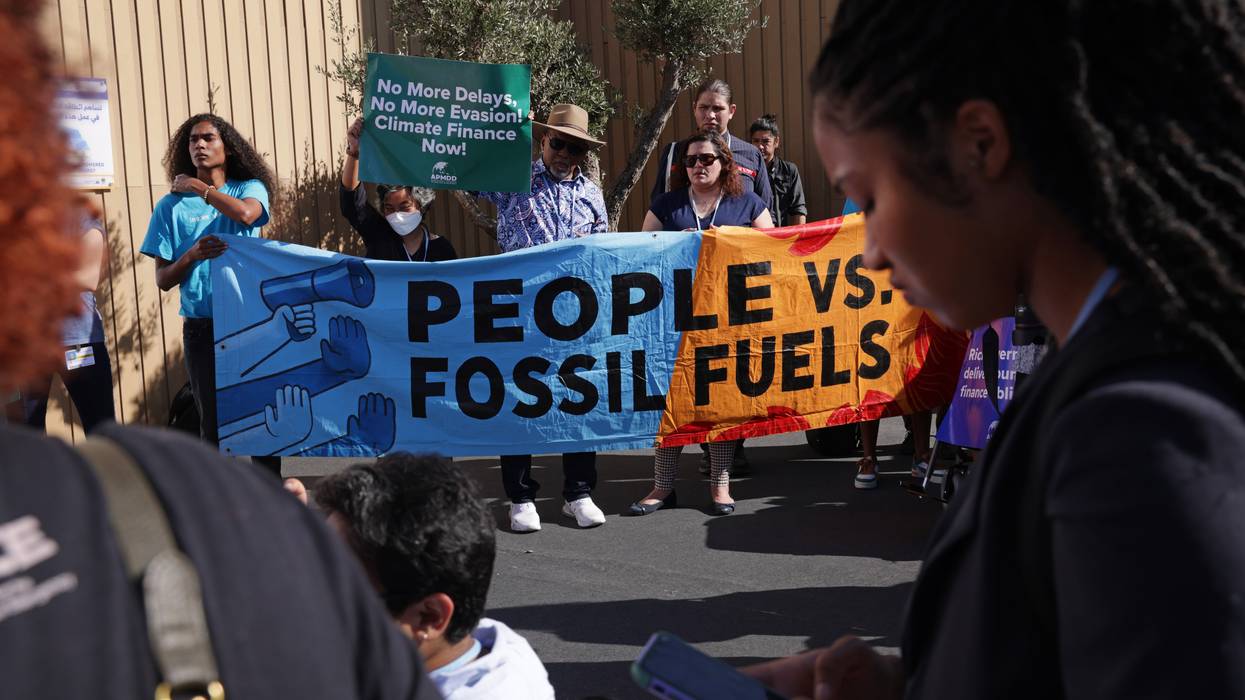38 Former World Leaders Have a Message: Tax Fossil Giants to Fight Climate Crisis
“Pressure is mounting on today’s politicians to hold those most responsible for the climate crisis to account," said one Greenpeace campaigner.
Thirty-eight former world leaders on Wednesday used the occasion of the United Nations General Assembly this week in New York—as well as other global summits on the horizon—to demand a new global framework for steeper taxes on the world's wealthiest and most powerful fossil fuel giants to pay for an urgent transition away from dirty energy sources toward a healthier planet and more equitable economy.
Under the auspices of the nonpartisan Club de Madrid, the world’s largest forum of former democratically-elected presidents and prime ministers, an open letter—signed by Carlos Alvarado, former President of Costa Rica; Mari Kiviniemi, former Prime Minister of Finland; Chandrika Kumaratunga, former President of Sri Lanka; former UN Secretary General Ban-Ki Moon; and dozens of others—calls the climate crisis "a defining challenge of our time" and urges current leaders to "place the question of fair taxation of fossil fuel company profits firmly on national and international agendas" before it is too late.
"With wealthier countries leading by example," say the leaders, increased taxation of the world's coal, oil, and gas giants coupled with a redirection of taxpayer subsidies away from the fossil fuel sector and toward a just renewable energy transition "could be transformative, enabling a faster and fairer global transition and strengthening public trust that climate action can deliver tangible benefits for all."
"Taxing fossil fuel profits is not only fair—it is also essential to ease the economic burden of the climate crisis, felt by ordinary people through higher food prices, lost working days, pressure on energy bills and higher home insurance premiums.”
Citing the need for global cooperation and ambition to address the warming planet and ongoing climate breakdown, the open letter states:
It is time to consider innovative solutions that can simultaneously establish a clear incentive for companies to shift investment to renewable energy as quickly as possible, while mobilising significant funds to address climate damages and advance both equality and equity. Today, we call on you to consider permanent polluter profit taxes applied to high-emitting industries, designed to ensure contributions come from those with the greatest capacity to pay rather than from ordinary consumers of fossil fuels. With wealthier countries leading by example, these taxes should place the primary responsibility on those with the greatest capacity, not on middle- and low-income communities.
The former world leaders acknowledge the strain governments feel about generating the necessary revenue, estimated at approximately $6.5 trillion per year by 2030, to fund the rapid transition scientists and experts say is necessary to avoid the worst future impacts of an increasingly hotter planet. However, they argue that the polluting companies that have profited most from the fossil fuel era are best positioned to foot the bill, and that the cost of action is far less than the cost of fixing the damage that future climate change will cause if left unaddressed.
"During the oil and gas price crisis in 2022, many governments implemented windfall taxes. We must consider making such approaches permanent," the letter argues. "A polluter profits tax modestly applied to normal returns and significantly higher on windfall gains could, if applied just to oil, coal, and gas companies, generate up to $400 billion in its first year."
Rebecca Newsom, Greenpeace International's global political lead for its "Stop Drilling Start Paying" campaign, said the letter represents what real leadership looks like and that forcing fossil fuel giants to pay higher taxes to help solve the planetary crisis their insatiable greed has spurred has never been more popular with the people worldwide.
"This is a powerful call from former world leaders to make oil and gas corporations pay their fair share for the destruction they have caused," said Newsom.
Noting recent survey data, Newsom said 8 out of 10 people around the world now "support taxing these polluters for climate damages—the backing of former political leaders adds more weight to this urgent demand."
“Pressure is mounting on today’s politicians to hold those most responsible for the climate crisis to account," she said. "Taxing fossil fuel profits is not only fair—it is also essential to ease the economic burden of the climate crisis, felt by ordinary people through higher food prices, lost working days, pressure on energy bills and higher home insurance premiums.”
With the upcoming G20 summit in South Africa and the UN Global Tax Convention in Kenya, both scheduled for November, the former world leaders say the moment is right for global leaders to finally show urgency on the issue.
"The world has the tools, the knowledge, and the resources to act," their letter concludes. "What is needed now is the political courage to ensure that those with the greatest capacity contribute their fair share. This will not only advance climate justice but also strengthen the foundations of a more stable, resilient, and prosperous global economy."
Greenpeace's Newsom said the message is clear. "Governments must find the courage to decisively tax oil and gas corporations and redirect those funds towards a just transition away from fossil fuels and a safe future in the face of a climate crisis.”


